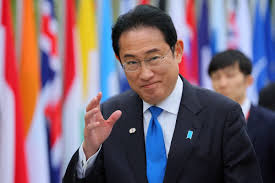On June 15, Japanese Prime Minister Fumio Kishida urged the world to unite in the pursuit of “fair and lasting peace” in Ukraine. His call to action came during his attendance at the peace summit in Buergenstock, Switzerland, where he stood as one of the few Asian leaders present.
Despite Ukrainian President Volodymyr Zelensky’s plea for their leaders’ personal participation, most Asian countries were represented at the international gathering not by their head of state or head of government but by ministers, officials, and other representatives. Mr. Kishida and Timor-Leste Prime Minister Xanana Gusmao were notable exceptions.
“Many in Asia see the conflict in Ukraine as far away and not of key concern to them, despite the fact that Russian aggression towards Ukraine affects grain supply and fossil fuel prices,” said Associate Professor Chong Ja Ian from the National University of Singapore’s (NUS) political science department.
The Summit in Switzerland
Context and Importance
The peace summit in Buergenstock was a critical meeting aimed at fostering global dialogue on the ongoing conflict in Ukraine. The summit saw participation from a diverse array of countries, albeit with varying levels of representation.
Prime Minister Kishida’s Speech
In his address, Prime Minister Kishida emphasized the need for international collaboration to achieve peace in Ukraine. He highlighted the broader implications of the conflict, particularly its impact on global grain supply and energy prices, which resonate deeply even in distant regions like Asia.
Asia’s Stance on the Ukraine Conflict
Limited Representation at the Summit
Despite the significance of the summit, the attendance of Asian leaders was sparse. Most countries from the region sent lower-level representatives, reflecting a general perception that the conflict is geographically and politically distant.
Exceptions to the Rule
Prime Ministers Kishida and Gusmao stood out as exceptions, showcasing their countries’ commitment to engaging in global peace efforts. Their presence underscored the importance of high-level involvement in addressing international crises.
Why the Ukraine Conflict Matters to Asia
Economic Implications
The war in Ukraine has disrupted global grain supplies and caused fluctuations in fossil fuel prices. These economic repercussions are felt worldwide, including in Asian economies that rely heavily on these resources.
Geopolitical Ramifications
While geographically distant, the conflict in Ukraine has significant geopolitical implications. It challenges the international order and sets precedents that could affect security dynamics in other regions, including Asia.
Perspectives from Experts
Insights from Academia
Associate Professor Chong Ja Ian from NUS points out that the war’s impact on grain and fuel prices directly affects Asian countries. He emphasizes the need for regional leaders to recognize these connections and participate actively in global peace initiatives.
Voices from the Political Sphere
Political analysts in Asia have noted a growing awareness among policymakers about the indirect consequences of the Ukraine conflict. This awareness is slowly translating into more active engagement in international discussions.
Challenges in Mobilizing Asian Support
Perception of Distance
One of the main challenges in garnering support from Asian countries is the perceived distance of the conflict. Many view it as a European issue, not directly relevant to Asian interests.
Domestic Priorities
Asian nations often prioritize domestic issues over international conflicts, especially when the latter seem remote. This inward focus can limit their participation in global efforts like the peace summit.
The Role of Japan and Timor-Leste
Japan’s Leadership
Japan, under Prime Minister Kishida, has taken a proactive stance. Kishida’s participation in the summit reflects Japan’s commitment to playing a more significant role in global peacekeeping efforts.
Timor-Leste’s Involvement
Prime Minister Gusmao’s attendance signals Timor-Leste’s emerging role in international diplomacy. It highlights the country’s growing influence and willingness to engage in global issues.
Future Prospects for Asian Involvement
Increasing Awareness
As the economic and geopolitical consequences of the Ukraine conflict become more apparent, there is potential for increased awareness and engagement from Asian countries.
Building Alliances
Strengthening alliances and partnerships can help Asian nations play a more active role in global peace efforts. Collaboration with international bodies and other regions is key to this process.
The peace summit in Switzerland highlighted the need for global cooperation to address the conflict in Ukraine. Prime Minister Kishida’s call for a “fair and lasting peace” underscores the importance of involving all regions, including Asia, in these efforts. Despite initial reluctance, the economic and geopolitical implications of the conflict are slowly driving more Asian countries to engage in international peace initiatives.




